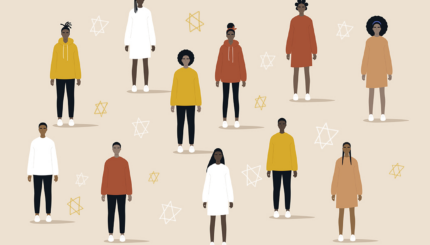Considering that the very first mitzvah (commandment) in the Torah is “to be fruitful and multiply,” it should come as no surprise that nurturing a family is considered of utmost importance in the Jewish tradition. Creating a Jewish family has been thought of not only as a matter of personal desire but also as an act that will have lasting impact on the greater community. As a minority culture in the world at large, the creation of Jewish families concerns emotional and spiritual issues of legacy and continuity. As far back as the archetypal stories of the Hebrew Bible, choosing the right marriage partner is given great significance. Today, having children and instilling Jewish values in them is seen as a counterbalance to the shrinking Jewish populace, and some Jews believe they have a responsibility to create Jewish children in part to make up for the vast number of Jews lost during the Holocaust.
 Challenges to the Jewish Family
Challenges to the Jewish Family
The contemporary Jewish community confronts the many social issues that are shifting the look and definition of “Jewish family.” An increasing number of Jewish families today do not conform to the traditional image of the “nuclear” family that has two parents–a man and a woman married to and living with each other–with 2.5 children. Jewish families today come in many different configurations, from single-parent families, to blended families, to families headed by a gay or lesbian couple.
Jewish marriages are no more immune from divorce than any other group in North America, in which one of every two marriages dissolves. Divorce impacts the Jewish family, though, in specific ways, as parents need to come to some consensus on how observant to raise their children and whether to send them to Jewish schools. In particular, holiday celebrations–where the emphasis is on family and home–present increased stress for divorced families, creating fewer opportunities for children to get to know extended families on both sides.
Adoption in Jewish Families
Adoption is also on the rise in Jewish communities, for several reasons:
With your help, My Jewish Learning can provide endless opportunities for learning, connection and discovery.
· Couples are waiting longer than in the past to get married and have children, increasing fertility problems.
· Many women, having spent years focusing on education and career, experience difficulty finding Jewish partners when they feel ready to marry. This is partly due to the fact that a higher percentage of Jewish men than Jewish women marry a non-Jewish partner. Some will choose to adopt children as single parents.
· Gay and lesbian couples are finding Jewish communities to be increasingly accepting of them, and they are adopting children and raising them within the Jewish community.
Many adopted children come from racial minorities in America or from other countries, such as China or South America, creating an increased number of multicultural and multiracial families. Parents then face the challenge of instilling in their children a Jewish identity as well as pride in their native culture; with the American Jewish community overwhelmingly white, children of color also face all the issues of being different and facing potential taunting or discrimination from classmates or synagogue peers. Several new organizations dedicated to the needs of Jewish multicultural families have recently formed.
Interfaith Families
Interfaith families are also a growing part of the portrait of Jewish families, and they are faced with myriad choices: one religion for the whole family or two? Jewish communities are likewise faced with choices about how accepting to be toward interfaith families: Is it better to embrace interfaith families in hopes the children will become and remain active in the Jewish community? Or should the opposition that many Jews feel toward intermarriage lead them to a less-than-welcoming stance toward interfaith families?
With so much emphasis on families, unmarried Jewish adults have often felt sidelined in Jewish communal life. As more Jewish adults choose the single life style–or remain unmarried by default–it remains to be seen whether they will become integrated into a synagogue life that so often focuses on the education of children and families, or whether they will create new communities on their own.
The ever-changing contemporary Jewish family challenges our notions and stereotypes of a “model” family unit. Many Jews who may have felt excluded from the tribal family in years past still hope to find their place within the Jewish community. Yet as the Jewish community grows in its awareness that Jewish families come in varied configurations and dynamics, so too may its institutions grow to be open to the diversity of Jewish families today.


